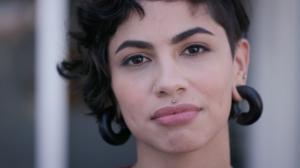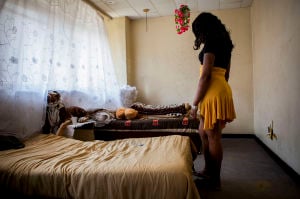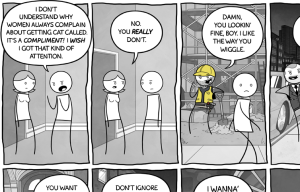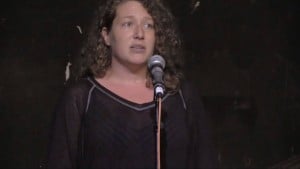Originally published on Towards Freedom and republished here with the author’s permission.
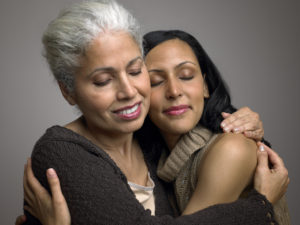
An elder hugs someone younger than them, their arms wrapped around each other in support.
I’m sure you’ve heard it before. “Violence against women is a GLOBAL social problem of EPIDEMIC proportions.”
But if it’s not something that’s happening within the scope of your life in some way, it can be easy to gloss over without understanding the true depth of the issue. Because why would I care about the score of the latest footy match if I have no interest in sports, right? People generally tend to learn about things that have some kind of bearing on their own life.
Well, I’ve got some news for you. Maybe it’s surprising, maybe it’s not – but here are 5 reasons why everyone should learn about intimate partner violence… even you.
1. Because you already know someone experiencing it.
Yep – straight up, not joking, and probably more than just one person. 1 in 4 Australian women have experienced emotional abuse by a current or former partner and 1 in 6 Australian women have experienced physical or sexual violence from a current or former partner.
1 in 4 and 1 in 6. That’s damn scary. These are not just statistics. These are undoubtedly people you know – your colleagues, your friends, your classmates, your clients, your customers. Whenever you’re in a room full of people, a proportion of them have experienced intimate partner violence.
Would you pay attention to a stop sign if you didn’t know what it meant?
You can’t see the signs of intimate partner violence if you don’t know how to read them and if you can’t read them you won’t notice when people in your life might be being abused.
Learn to read the signs of intimate partner violence to support the people in your life to live free from fear.
2. Because you want to respond appropriately to someone who discloses to you.
If you can’t recognize the signs that someone might be being abused, it is less likely that someone would tell you. But it doesn’t mean that it won’t happen. I have had many people tell me that they had someone disclose abuse to them, but they simply didn’t know what to say or do. They were out of their depth.
I have had even more survivors tell me the harsh things family, friends, nurses, doctors, employers, teachers or police said to them after they disclosed:
“But what were you wearing?”
“What did you do that made him so angry?”
“I can’t imagine him hurting you like that, I’ve never seen him be violent – he’s such a nice guy.”
“Why would he want to stalk you?”
“It’s your word against his, love.”
All of these phrases send a message. A message that the victim isn’t really worthy of being believed, or that it mustn’t really be that big of a deal, or that the victim is somehow at fault for the abuse.
People often don’t understand the consequences of their responses and honestly, I don’t think any of them meant to put the victim down and cause further harm. I think they were just trying to better understand the situation. You see, we’ve been so conditioned to blaming victims that we do it all the time without even noticing.
But it’s not a survivor’s role to educate us or help us understand intimate partner violence; that onus is on as a society.
By the time someone is ready to disclose, it’s already bad. So bad. And they’ve been doing so many things to manage the violence and keep themselves safe. But it’s come to a critical point of realization where they’ve decided to make themselves vulnerable in demonstrating great courage to share their story – to reach out.
This is a critical opportunity and the way we respond will actually effect the likeliness of the victim to feel empowered and to continue to reach out for support. If we don’t respond appropriately, victims may blame themselves and think that they deserved it or brought it on themselves (which of course, is just not so).
Responding in a way that makes the victim feel that they are unworthy of belief or somehow responsible for the violence is a form of secondary abuse and can have lasting traumatic effects. It is so important that we seize these opportunities and respond with compassion and empathy.
This is why you need to learn about intimate partner violence and understand it as a social justice problem, because even well-meaning responses can have damaging effects if they are uninformed.
3. Because you might think that separation equals safety.
Separation can actually be the most dangerous time for victims as the perpetrator becomes desperate not to lose control. FYI, ex-partners are one of the most common perpetrators of violence that women face. Yet, there are courts who will not grant restraining orders because the victim is now in a refuge or living somewhere else. The assumption is that because they are separated, the violence will end too.
Unfortunately, this is rarely true. Think about all the murdered women (and children) we hear about in the media every week – many of them, Rosie Batty herself included, had left the relationship. The violence clearly did not stop there.
Yet without a doubt, the most frequently asked question I get, is “Why doesn’t she just leave?” Again, this question is a product of our social conditioning. The need to ask this question says a lot about our own assumptions and judgments of women.
When we ask this question we demonstrate our ingrained biases to hold victims (primarily women) accountable for the actions of perpetrators (primarily men).
We reveal our privilege of living free from fear and we expose the assumptions we make about victims of violence.
Learning about intimate partner violence is crucial. In a world where we’ve been programmed to question what women have done to deserve abuse (or why they don’t leave) rather than why men are abusing (or what are they doing to keep her from leaving), it is important to think critically about what we have been taught about gender and other societal norms. Only then can we question how legitimate these lessons really were.
4. Because you might not realize you’re contributing to the problem.
We struggle with this because we’re accustomed to blaming women for the actions of men. We’ve been told that men and women are equal and on the surface maybe we believe it, but we get sent daily subliminal messages that women are less valuable than men. This reinforces our internal subconscious beliefs, which ensures that we continue to perpetuate this messages ourselves.
Classic example: “You run/throw/cry like a girl.” We say things like this everyday without a second thought, but if you think about it, insulting someone by equating their abilities with the opposite gender is pretty sexist. I mean, if it’s an insult for a male to be referred to as a female, that sends a reinforcing message that girls/women are lesser than boys/men.
We’ve been brainwashed and we don’t even know it! Abusive behavior is always a choice, but if we fail to examine the underlying causes of such behaviors, then we won’t ever be truly able to prevent intimate partner violence from occurring in the first place.
Intimate partner violence arises from inequality and injustice. It mirrors and leverages societal power structures like sexism, racism, heteronormativity, homophobia, transphobia, ableism, etc.
If we are unaware of these larger power structures that have such a permeating influence on the way we have been taught to view the world, then we will be unable to see the ways we are sustaining the environment in which intimate partner violence can occur in the first instance – where perpetrators aren’t held accountable and victims continue to be blamed.
The victims in your life (unbeknownst to you or not) are listening to the way you reacted to Amber Heard’s allegations. They’re watching the stuff you share on social media about Brock Turner. They’re hearing all the things you haven’t said. The way we talk about stuff can reinforce cultural norms and also prevent victims from feeling safe to disclose.
Learning about intimate partner violence is essential for unpacking our internal biases and critically questioning the status quo.
5. Because you probably don’t realize the immense power you have to make a difference.
You make an impact on this earth whether you realize it or not. Once we become aware of this we can consciously choose what kind of difference we’re going to make instead of blindly following our social conditioning. Our thoughts and behaviors matter.
We constantly underestimate our own immense power to make a difference in someone’s life. But, you’ve already made profound impacts, the effects of which you will never truly know. Kind words or an understanding smile in a moment of despair can make the world of difference for someone – whether it’s someone you know or a complete stranger.
In a world where truly, fully listening is a lost skill, bearing witness to someone’s story and holding the space for them to be vulnerable and courageously share their feelings is a sacred gift and can make a real impact on someone’s life.
Whether it’s giving them the space to fully hear their own story and explore how they really feel for the first time, letting them know you believe them or providing them with some resources or support, it really doesn’t take much to make a difference. But the more informed you are about intimate partner violence, the more you will realize the power you have to make a difference. Never underestimate the power of humanity.
Intimate partner violence is often hidden in plain sight. Surrounded by silence, shame and coercive control, victims are often prevented from reaching out. But in a world where nearly one woman a week is being murdered by her current or former partner, it’s time for us to reach in. Someone you know could be next – and it’s totally preventable.
Make a commitment to yourself, the people in your life and humanity at large; learn about intimate partner violence so that you can feel confident in your ability to respond with compassion, know that you’re not further perpetuating oppressive social norms, and have the strength to interrupt everyday acts of sexism.
[do_widget id=’text-101′]
Heidi Guldbaek is a human rights advocate, social entrepreneur, and community development practitioner. Heidi has drawn from her experience of working in the anti-violence against women sector as an educator, advocate, and activist for the past eight years to establish Towards Freedom, a social enterprise connecting and inspiring a movement of people that consciously disrupt the thinking, actions, and systems that contribute to and sustain violence against women.
Search our 3000+ articles!
Read our articles about:
Our online racial justice training
Used by hundreds of universities, non-profits, and businesses.
Click to learn more








